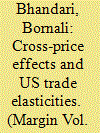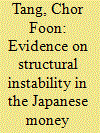| Srl | Item |
| 1 |
ID:
122458


|
|
|
|
|
| Publication |
2013.
|
| Summary/Abstract |
This article examines the interactions of the import and export markets through cross-prices. The idea is that import demand is affected by export prices, because imports and exports are likely substitutes in consumption. Additionally, import supply is also affected by export prices as exports may be intermediate inputs in the production of imports. The traditional partial equilibrium model of trade is extended to include these cross-price effects in demand and supply. Theoretically, it is shown that these cross-price effects can impede trade balance adjustment in the presence of exchange rate and income shocks. Using quarterly US and rest-of-the-world data from 1975 to 2002, a fully modified general method of moments estimation of the structural equations demonstrates significance of cross-price effects in both the demand and supply of non-petroleum merchandise imports.
|
|
|
|
|
|
|
|
|
|
|
|
|
|
|
|
| 2 |
ID:
122460


|
|
|
|
|
| Publication |
2013.
|
| Summary/Abstract |
The purpose of this article is to examine the relationships between real estate market factors (transaction costs, landlord and tenant practices and property rights) and foreign real estate investments (FREI) after controlling for other relevant determinants of FREI. This article uses related observations from 38 countries to investigate the relationships between real estate market factors and FREI. Our analysis shows that countries with lower transaction costs and higher level of property rights attract greater amounts of FREI. Furthermore, our empirical results indicate that there is a positive and significant relationship between pro-landlord practices and FREI.
|
|
|
|
|
|
|
|
|
|
|
|
|
|
|
|
| 3 |
ID:
122457


|
|
|
|
|
| Publication |
2013.
|
| Summary/Abstract |
The main purpose of this study is to re-investigate the long-run Japanese M2 money demand function and its stability over the period of 1970:Q1 to 2010:Q4. This study uses the bounds testing approach to cointegration within the autoregressive distributed lag (ARDL) framework to examine the presence of a cointegration relationship. The rolling regression procedure is then incorporated into the ARDL cointegration test to investigate the stability of the cointegrating relationship between money demand and its determinants in Japan. With the full sample, this study confirms that real M2 money demand, real income, real interest rates and real exchange rates are cointegrated. However, the evidence of the rolling ARDL cointegration test implies that the cointegrating relationships are not stable over time, indicating that the Japanese M2 money demand function is also unstable. In line with the rolling ARDL cointegration results, the recursive Chow breakpoint F-test and the Quandt likelihood ratio (QLR) test also suggest the same instability outcome.
|
|
|
|
|
|
|
|
|
|
|
|
|
|
|
|
| 4 |
ID:
122456


|
|
|
|
|
| Publication |
2013.
|
| Summary/Abstract |
This article analyses the effects of government expenditures on German business cycle fluctuations by means of an estimated DSGE model based on low frequency oscillations. The results highlight that fiscal policy has a strong impact on the amplitude of fluctuations while hardly any on the duration of business cycles. To the extent that fiscal policy shocks are an important source for triggering economy-wide fluctuations, fiscal policy also strongly reacts to shocks originating elsewhere. Thus standard specifications of government expenditures in terms of simple AR(1) processes ignore the fact that there can indeed be a strong dependence of governmental variables on economic fluctuations.
|
|
|
|
|
|
|
|
|
|
|
|
|
|
|
|
| 5 |
ID:
122459


|
|
|
|
|
| Publication |
2013.
|
| Summary/Abstract |
The basic objective of this article is to evaluate the pricing implications of market-wide investor sentiment risk for cross-sectional return variations of Indian listed companies across industry groups. A multivariate time-series regression approach has been used to examine the impact of sentiment risk on stock return behaviour in the presence of other market-wide systematic risk factors. Our results suggest that the role of sentiment risk in the determination of a cross-section of stock returns is not uniform across the test asset portfolios formed on the basis of size, book-to-market equity, liquidity and momentum characteristics. For all portfolios, the impact of sentiment risk on the cross-section of stock returns behaviour has been disproportionately negative. The effect holds even after controlling for systematic market-wide risk factors. Although the impact of sentiment risk on industry-shorted portfolio returns persists in accordance with the theoretical argument, the cross-sectional variation with respect to different industries has been heavily dependent on the availability of stocks in that particular industry. The commonality of the sentiment effect across industry is not similar, as it is for the aggregate market. The results suggest that generalisation of the hard-to-value and difficult-to-arbitrage argument must be judged with caution, keeping the industry effects in mind.
|
|
|
|
|
|
|
|
|
|
|
|
|
|
|
|